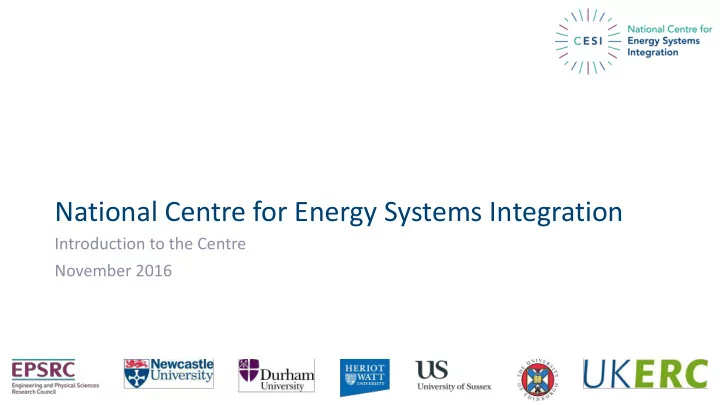

National Centre for Energy Systems Integration Introduction to the Centre November 2016
EPSRC National Centre for Energy Systems Integration What Is Energy Systems Integration (ESI)? • “the process of coordinating the operation and planning of energy systems across multiple pathways and/or geographical scales to deliver reliable, cost-effective energy services with minimal impact on the environment” as defined by the International Institute for Energy Systems Integration (iiESI) Key Point to note • Every energy system is different! Benefits of Whole Energy Systems thinking • Encourages the development of a more flexible energy systems for future security • Enables efficient integration of renewable energy onto the system and hence reduce carbon emissions • Provides an integrated platform for multi-vector solutions to the power, heat and transport fuel future challenges • Significant cost saving efficiencies can be realised as a direct consequence of these flexible solutions
EPSRC National Centre for Energy Systems Integration Challenge Energy Systems Integration - Approach of the Centre Energy systems vital for society and industry Whole system approach with trilemma evaluation. I ts not all about electricity!!! Need to improve Be highly collaborative, not duplicate Engagement with academic, industry, public and 3 rd sector • policy and planning decisions • planning and operational understanding, Potentially huge rewards to this approach processes and models Limitations in current methods Co-evolution of supply and demand core part of the centre uncertainty, temporal and spatial variation, and research methodology. behavioural dynamics, co-evolution, technical Multi disciplinary approach, Uncertainty quantification, detail and interdependencies Agents, SoS, Demonstration coupled with the power of High performance computing Robust messages about the real world.
EPSRC National Centre for Energy Systems Integration Research Aims Address current limitations: Uncertainty, Calibration, Behavioural dynamics, spatial and temporal variations, Representing interdependencies Addressed by: High Performance Computing Framework, Stochastic Programming, Agents, System of Systems, Fine Grain Data, Quantitative and Qualitative, Expert Judgement, Multi-Disciplinarity, Co-evolutionary approach to supply and demand, soft linking between models Validation: With full scale demonstrators and hardware evaluation and specifications, range of features, will produce data we can share Deliverables: Whole Systems Methodologies Deeper Understanding of ES Regulatory and Policy Analysis Robust transition pathways Common Framework Detailed models Advance test and demo facilities Workshops, engagement
EPSRC National Centre for Energy Systems Integration The Centre Partners 5 Leading Research Universities Newcastle University Durham University Heriot Watt University University of Sussex University of Edinburgh Leading Industrial Companies, NGOs and Government organisations Lead Partner Siemens
EPSRC National Centre for Energy Systems Integration CESI Work packages Highly collaborative and multi-disciplinary by design Seven work packages investigating the full spectrum of the energy system and its integration 1. Commercial, regulatory and policy aspects 2. Energy supply 3. Infrastructure and storage 4. Energy demand 5. Validation and demonstration 6. Multi-Scale Architectures 7. Impact, engagement and management
EPSRC National Centre for Energy Systems Integration Supply Storage Infrastructure Demand Policy Gas Energy Vector and Power Research Discipline cross cutting Renewables Transport Heating Cooling
EPSRC National Centre for Energy Systems Integration Unique collection of Whole Systems Demonstrators:
Where is the Centre’s research positioned? • Work in partnership with Energy Systems Catapult and Industry • Feed the energy innovation and ideas conveyor belt to solution development Prototypes in operational development and Basic Principles Observed and Technology Development, Demonstration Feasibility Investigated and Market Research Evolution to Full Commercialisation Technology Readiness 1 2 3 4 5 6 7 8 9 Levels (TRL) Industry (large and SMEs) Test, Development and Commercialisation
EPSRC National Centre for Energy Systems Integration The Centre Leadership Director Professor Phil Taylor Newcastle University Siemens Professor of Energy Systems and Director of the Newcastle University Institute for Sustainability, An internationally leading researcher and industrial expert in energy systems, electrical distribution networks, smart grids and energy storage integration and control. Associate Directors Professor Jon Gluyas Professor Gareth Harrison Professor Tony Roskilly Dr Sara Walker Dr David Flynn Professor Gordon Mackerron Professor in CCS & Geo-Energy Bert Whittington Chair Director, Sir Joseph Swan Senior Lecturer Associate Professor Professor Of Science And Centre for Energy Research Director of Smart Systems Group Technology Policy Newcastle University Newcastle University Heriot Watt University University of Sussex Durham University University of Edinburgh
EPSRC National Centre for Energy Systems Integration The Centre Governance Chair Colin Henry Industrial Innovation Board Head of Business • Members drawn from the Energy Industry, Local and National Digital Grid Automation Systems Siemens plc Government and Energy Stakeholders such as Housing Associations and NGO’s Purpose and Aims 1. Advise on the innovation of Centre’s research and demonstration 2. Advise on the application of the research to the Energy sector 3. To provide feedback on the performance of the Centre 4. To provide a sounding board for testing of ideas and initiatives of the Centre 5. To improve the Centre’s interaction with Industry 6. To consider and ratify funding allocations of Centre’s £1M Flexible Research Fund
EPSRC National Centre for Energy Systems Integration The Centre Governance Chair Mark O'Malley International Scientific Advisory Committee Director of International Institute for • Members drawn from the Energy Research community and includes Energy Systems Integration (iiESI) Professor of Electrical Engineering leading international research institutes from throughout the world University College Dublin Purpose and Aims 1. Advise on the state of the art significance of the Centre 2. Advise on the application of the research to the scientific community 3. To provide feedback on the performance of the Centre 4. To provide a sounding board for testing of ideas and initiatives 5. To improve the Centre’s interaction with the International Scientific Community 6. To consider and ratify funding allocations of Centre’s £1M Flexible Research Fund
Foresight Building energy performance Building Design Physics Grid Systems Mechanical Engineering Geology Electrical Engineering Future Cities Infrastructure Anthropology Transport Systems Uncertainty Computer Science Collaboration, Collaboration, Collaboration … Mathematics Economics Analytics Statistics Big Data Cloud Computing Policy
Website : http://www.ncl.co.uk/cesi Twitter : @cesienergy Email : cesi@ncl.ac.uk
Recommend
More recommend